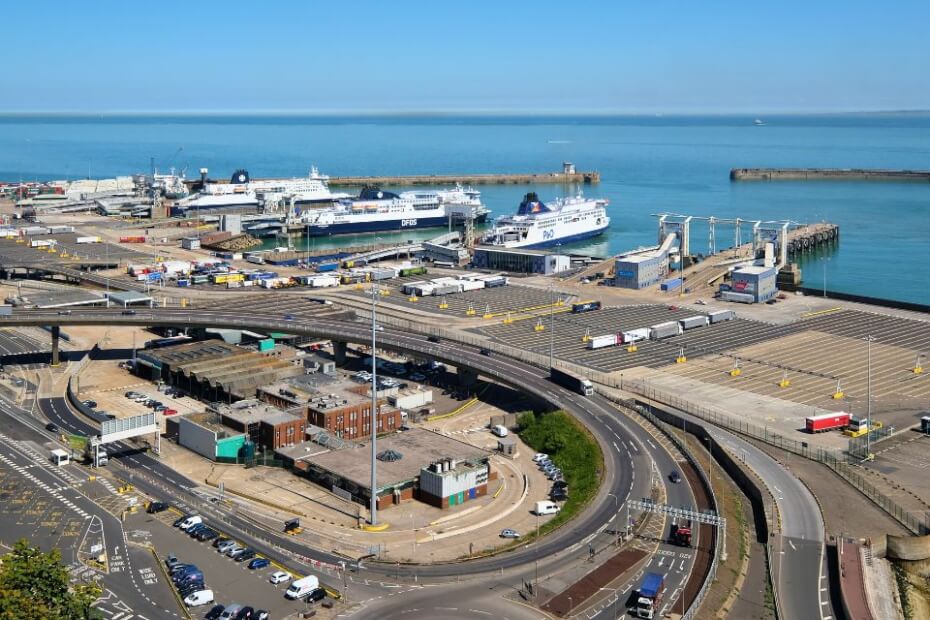
Kent councils urge the United Kingdom (UK) Government to prevent travel disruptions when the European Union’s (EU’s) new Entry/Exit System (EES) goes live.
The EU plans to roll out its new automated border check system in October or November 2024.
The EES will require all non-EU travelers to register fingerprint or facial scans upon entry and exit at the EU’s external borders.
This includes British travelers, now considered third-country nationals in the EU after Brexit, and short-stay visa holders.
It aims to enhance border security, improve the management of the EU’s external borders, and facilitate easier identification of overstayers.
The system will replace the current practice of manual stamping of passports, which is considered time-consuming and less secure.
Still, travel and transport industry experts have raised concerns that this will lead to significant delays and long queues at border crossings.
They expected the delays to be worse at busy travel points like the Port of Dover in Kent and the Channel Tunnel in Folkestone.
Kent, often called the “Gateway to Europe,” plays a crucial role in the UK’s international trade and travel.
Any disruptions here can have widespread effects on the UK economy and daily life.
Potential impact of delays due to EES in Kent
Local businesses in Kent, particularly those reliant on cross-channel trade, are anxious about the changes.
Leaders in Kent are particularly concerned about how the EES will affect traffic flow and travel times.
They have previously warned a UK Parliament Committee of delays of up to 14 hours during worst-case scenarios.
Leaders from 14 councils in Kent asked the government to “recognize the severe risk of disruption” the EES would bring.
The Port of Dover and the Channel Tunnel are two of the UK’s busiest border crossings, handling millions of passengers and vehicles annually.
The new system requires each traveler to undergo biometric checks, significantly increasing the time it takes to process each individual.
With the number of people and vehicles passing through the borders, even a bit of delay can have a massive domino effect.
Kent’s council leaders have voiced their concerns in a letter to Transport Secretary Louise Haigh.
They emphasized that the new system could severely impact travelers and international trade without proper measures.
They warned that the increased border checks could lead to “gridlock” in the region, affecting passengers and freight transport.
“The introduction of the EES without adequate preparations could cause chaos,” the letter stated.
If Kent is gridlocked, it will significantly impact supply chains, making the EES checks a national problem, not just a Kent problem.
Kent Councils’ demands to the UK Government

“We are calling on the new Government to urgently do everything in its power to reduce the risk of disruption,” the letter stated.
Kent’s council leaders are calling for several actions from the government “as a matter of urgency:”
Increased Funding: Additional financial support is needed to upgrade infrastructure and manage increased traffic long-term.
Right technology: The proper technology could allow the Port of Dover to process passengers more quickly on- and off-site.
Better Coordination: Closer collaboration with EU authorities can ensure smooth EES preparations and implementation.
Access to Data: More information on timelines and data modeling is needed to plan effectively.
Kent Councils have previously called upon the government to support Kent in managing post-Brexit border checks.
What the UK Government is doing to prepare for EES
The UK Government has acknowledged the potential issues and is working on measures to minimize disruption.
The Department for Transport (DfT) told the BBC that it was reviewing the previous government’s EES preparations.
This includes ensuring that ports and carriers have the proper technology and processes, which is essential for smooth EES registration.
The DfT added it is “working closely with the European Commission, local authorities and agencies, as well as the travel industry.”
This is to ensure that everyone is preparing effectively for the introduction of the EU’s new border checks.
UK admitted to insufficient EES preparations

Home Secretary Yvette Cooper recently admitted in a statement to Parliament that the UK is still unprepared to handle the EU’s EES system.
Still, the UK government has taken several steps to enhance the preparations the previous government has laid out.
Cooper revealed that they have been lobbying the EU for a more flexible EES implementation for UK travelers during peak hours.
This includes proposing an initial grace period during which the new checks would be less stringent, allowing for smoother adaptation.
They have also proposed extending this more flexible rollout until early 2025 to accommodate busy holiday seasons.
Plans are underway to enhance border facilities and train additional staff to handle EES checks more efficiently.
This includes installing more EES-compatible kiosks and improving the infrastructure to handle the anticipated increase in processing time.
These efforts aim to mitigate delays and ensure that the border remains as efficient as possible.
Looking ahead
The upcoming changes with the EES represent a significant shift in managing border controls in Europe.
While the system aims to improve security, it also presents challenges that must be promptly addressed.
The urgency expressed by Kent’s leaders emphasizes the need for proactive measures to minimize disruptions caused by the new system.
As the EES implementation date approaches, Kent councils continue to press for more decisive action from the government.
Collaboration between local and national authorities, as well as with EU partners, will be key to effectively navigating this transition.

